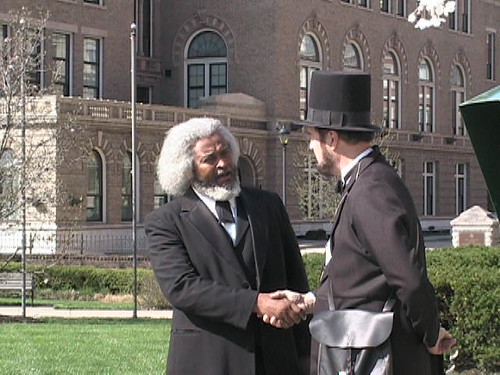During these times of heated political election year politics agreement across the political spectrum has been achieved that the financial institutions on Wall St. are in terrible shape. The agreement that things are a mess very quickly falls apart when it is broken down into who is to blame for this mess, and what can be done to clean the mess up. The disagreement over who is to blame reminds me of the song It Wasn't Me by Shaggy - especially this part of the lyrics
To be a true player you have to know how to play
If she say a night, convince her say a day
Never admit to a word when she say makes a claim
And you tell her baby no way
So the true players that opened up this new road to the abyss are Alan Greenspan, Robert Rubin, Sandy Weill, Phil Gramm, Jim Leach, Tom Bliley, Barney Frank, Bill Clinton,
Alan Greenspan -
In 1990, the Fed, under former J.P. Morgan director Alan Greenspan, permitted guess who J.P. Morgan–to become the first bank allowed to underwrite securities.
Four legislative attempts were made to weaken or repeal parts of Glass-Steagall from 1988-1996. One reason they failed is because smaller banks feared that opening the doors to allow banks to trade in securities would lead to the domination of larger banks–a fate that has come to pass.
The biggest change came in 1996 when Alan Greenspan issued a ruling allowing bank investment affiliates to have up to a quarter of their business in investments.
Robert Rubin - in testimony before Congress in 1995The banking industry is fundamentally different from what it was two decades ago, let alone in 1933.” He said the industry has been transformed into a global business of facilitating capital formation through diverse new products, services and markets.
U.S. banks generally engage in a broader range of securities activities abroad than is permitted domestically. Even domestically, the separation of investment banking and commercial banking envisioned by Glass-Steagall has eroded significantly.
Robert Rubin - following Shaggy's strategy in 2008If Wall Street companies can count on being rescued like banks, then they need to be regulated like banks.
He was
for the deregulation
before he was against the deregulation.
Sandy Weill - Here you have the leadership, Sandy Weill of Travelers and John Reed of Citicorp, saying, Look, the Congress isn't moving fast enough. Let's do it on our own. To heck with the Congress. Let us effect this. And so they move towards effecting it, and they get the blessing of the chairman of the Federal Reserve system in early April, when legislation is pending.
I mean, this is hubris in the worst sense of the word. Who do they think they are? Other people, firms, cannot act like this. Citicorp and Travelers were so big that they were able to pull this off. They were able to pull off the largest financial conglomeration the largest financial coming together of banking, insurance, and securities when legislation was still on the books saying this was illegal. And they pulled this off with the blessings of the president of the United States, President Clinton; the chairman of the Federal Reserve system, Alan Greenspan; and the secretary of the treasury, Robert Rubin.
And then, when it's all over, what happens? The secretary of the treasury becomes the vice chairman of the emerging Citigroup.
Phil Gramm James Leach Thomas Bliley -
The Citi-Travelers Act went under the benign-sounding name of the Financial Services Modernization Act of 1999 and, like Glass-Steagall it has become known for the key sponsors of the bill as the Gramm-Leach-Bliley Act, for Republican Senate Banking Committee Chair Phil Gramm, House Banking Committee chair James Leach, and Virginia Representative Thomas Bliley.
Lobby money to push through the Gramm-Leach-Bliley Act -
In the year previous to the Financial Services Modernization Act, the thing that overruled Glass-Steagall, Citibank spent $100 million on lobbying and public relations, which is a good indication.
Yes. They spent a small fortune, a king's ransom, if you will, getting rid of Glass-Steagall. In fact, when thrown in with other financial firms lobbying, it was closer to $200 million over the short period of time.
The Industry's efforts to jump-start progress on the Senate bill is a case study in how a well-heeled and well-organized interest group can swiftly prod Congress to move, even on an issue about which most people outside Washington and New York have little knowledge.
Nor is it surprising, according to both political science and economic literature, that the interest groups played a vital role in the timing of the 1999 deregulation. Without persistent lobbying by commercial and investment interests it is unlikely that reform would have taken place in this century.
Barney Frank -There was only one problem: the bill had to reconcile differences between the House and Senate versions. The House version differed in two important ways: 1) It took regulatory authority from the Federal Reserve and gave it to the Secretary of the Treasury and 2) it refused to extend to insurance companies obligations under the Community Re-investment Act to provide information about their patterns of mortgage lending.
Democrat Barney Frank was among those who especially opposed the second.
We do a good job in fostering conditions in which our capitalist system can flourish and it's in our interest that our capitalist system flourish. But can we try to do a little bit for those who are being left behind. This is an inappropriate continuation of a pattern of helping those who need a benefit but ignoring those who are left behind.
How the Gramm-Leach-Bliley Act became law -
On Oct. 21, with the House-Senate conference committee deadlocked after marathon negotiations, the main sticking point is partisan bickering over the bill's effect on the Community Reinvestment Act, which sets rules for lending to poor communities. Sandy Weill calls President Clinton in the evening to try to break the deadlock after Senator Phil Gramm, chairman of the Banking Committee, warned Citigroup lobbyist Roger Levy that Weill has to get White House moving on the bill or he would shut down the House-Senate conference. Serious negotiations resume, and a deal is announced at 2:45 a.m. on Oct. 22. President Bill Clinton signed this bill into law on November 12, 1999.
Bill Clinton -
So we know that the topic of that late night phone call between Bill Clinton and Sandy Weill, the man whose career began in the subprime mortgage business, was the Community Reinvestment Act. We know that Phil Gramm, who was the one most strongly pushing for gutting CRA (Leach actually supported it) threatened to torpedo the legislation if the White House did not reach an agreement.
So why did Clinton go along? His writings are silent on the subject. He seemingly held the trump card with the threat to veto any legislation that did not meet his approval. And why is it Sandy Weill who makes the phone call to Clinton? At this point not enough evidence is available to finally connect the dots, but whatever it is, it cannot possibly benefit Bill Clinton. The reason for the silence may be that for the Clintons the repeal of Glass-Steagall may prove far more embarrassing in the long run than Monica Lewinsky.
Barack Obama - when asked if he would restore Glass-SteagallWell, no. The argument is not to go back to the regulatory framework of the 1930's because, as I said, the financial markets have changed substantially.
Obama's top campaign contributors include Goldman Sachs, J.P.Morgan, and Citigroup.
Where are these players today
Alan Greenspan -
Retired as chairman of the Fed in 2006, he is married to staunch Obama supporter and NBC correspondent Andrea Mitchell.
Robert Rubin -
Chairman of Citigroup and one of Obama's economic advisors
Sandy Weill -
Retired as chairman of Citigroup in 2006
Phil Gramm -
Retired from the US Senate in 2003. Served as John McCain's campaign co-chair and most senior economic advisor until July 18, 2008.
James Leach -
Defeated in the 2006 midterm election for US House, Iowa's 2nd District. He currently is the Director of Harvard University Institute of Politics at Kennedy School of Government. On August 12, 2008, Leach broke party ranks to endorse Democrat Barack Obama against John McCain for the American presidency. He spoke at the 2008 Democratic National Convention in Denver Colorado on the night of August 25, 2008.
Thomas Bliley -
Retired from the US House 7th District Virginia in 2001, and he was succeeded by Eric Cantor.
Barney Frank -
Current chairman of the House Financial Services Committee. Earlier this year he told Obama campaign staff Eric Holder and Caroline Kennedy that he would have a hard time voting for the ticket if Obama picks former US Sen. Sam Nunn as his running mate.











































